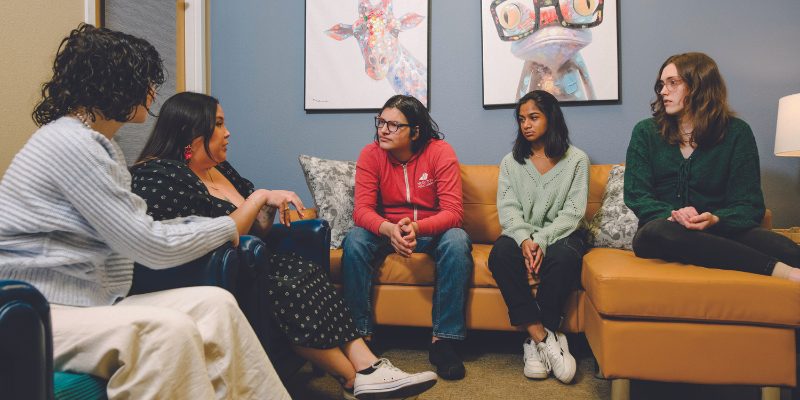By Hannah Wente | Photography by Hillary Schave
In October 2022, the #MeToo movement and viral hashtag turned five years old. For sexual violence survivors, this slogan has become a way to shed light on an issue that one in four women experience in their lifetime, according to the National Sexual Violence Resource Center.
Now, #MeToo exists as an organization (meetoomvmt.com) to support justice and healing for sexual violence survivors. Informally, the hashtag is used in social media to share stories and support on the topic.
According to a 2022 Pew Research survey, the movement has made an impact. Seventy percent of Americans surveyed said that people who commit sexual violence in the workplace are more likely to be held responsible than five years ago. As sexual violence topics continue to make headlines, the issue is one that younger women aren’t shying away from. For local sexual violence advocates, the future of the movement is about amplifying the voices of youth to encourage advocacy, support and building a society we all feel comfortable in.
Peer to Peer Connections
The RCC Sexual Violence Resource Center (formerly known as the Rape Crisis Center, or RCC) started the GameChangers program in 2015 to teach teens about sexual violence prevention. Today, 21 high school students from all over Dane County gather twice a month between October and May to connect, learn and share about topics related to sexual violence. What’s unique about GameChangers is that students are paid for their time — which opens up the pool of kids that can join since economic barriers (i.e., volunteering for free) aren’t an issue.
“The biggest thing we do is provide space for teens to speak and say things they’ve never had the chance to speak about and say,” explains Dana Pellebon, executive director of the RCC.
Magnolia Hottmann, a 14-year-old GameChanger from Middleton High School, says, “It’s a very safe community where we have difficult discussions, but we do them respectfully and we’re able to easily communicate with each other.”
Students learn advocacy and facilitation skills from community leaders and use those lessons to complete a project during the second half of the school year. For example, in April 2022, students hosted a workshop for 50 school administrators, staff and community members about how to best support student sexual violence survivors.
Nitya Patil is a 17-year-old senior at Vel Phillips Memorial High School. She joined GameChangers to transform her community.
“I saw sexual violence and assault so normalized in youth spaces such as schools and community centers,” says Patil, who intends to pursue a degree in global health and engineering. “I’m excited to take what I’ve learned about advocacy for sexual assault victims and advocacy in general to really make a difference for those who feel like they can’t speak up.”
Since RCC prevention coordinator and GameChangers director Heather Chun took over in 2017, the group has expanded to encompass a wide range of sexualities, races and socioeconomic statuses.
As part of RCC’s advocacy work, Chun also visits East High School and Oregon High School’s gender equity clubs to educate and promote peer-to-peer education. They work on recognizing emotions, healthy behaviors and what consent looks like at every level — including setting boundaries. The RCC also provides services to teen sexual violence survivors to help them deal with trauma.
“We make sure [students] feel supported as they make choices to disclose traumatic information — to parents and to therapists,” says Pellebon.
Shedding Light on Sexual Violence
The #MeToo movement has helped to shift public opinion towards disclosing sexual violence incidents and believing victims’ stories. Pew Research’s 2022 survey echoes this, stating 62% of Americans say that a survivor’s account is more likely to be believed now than five years ago.
“I’ve been in this field for 30 years,” says Jennifer Ginsburg, executive director of Safe Harbor Child Advocacy Center, which conducts forensic interviews with children after an allegation of abuse or sexual violence. “Teens are talking about it more, they’re getting more support from their peers and there’s less victim blaming and more understanding — especially around alcohol-facilitated sexual assault. When you’re drunk and impaired you cannot give consent — there’s more understanding of that.”
In 2022, Safe Harbor saw 428 youth — 33% were between the ages of 13 and 17. That same year, 65% of all youth maltreatment cases involved allegations of sexual abuse. Ginsburg says Safe Harbor has seen an increase in gay, lesbian, bisexual and transgender youth coming forward with their experiences over the past several years.
“The best thing the community can do,” says Ginsburg, “is believe victims/ teens when they disclose. They need to be supported and believed. Perpetrators count on [a survivor] being silent and others not believing [the survivor’s] story — and that is what allows the perpetrator’s behavior to continue. And then society is complicit in it.”
“Silence can be a problem,” says Sharyl Kato, executive director of The Rainbow Project. “I’m so encouraged by the courage of others to step forward when something has happened to them. We all have personal power that no one can take away from us. We all need to embrace it and use it in positive ways to speak out.”
What Safe Harbor and the Rainbow Project do is critically important for children and families. But it goes beyond that — the services they provide have a lasting effect on survivors. Although trauma can never be “healed,” intervening with support and services helps a survivor to move forward and understand that the abuse they endured wasn’t their fault.
“With the #MeToo movement, hopefully we can create a different country. [We can] be more supportive of children, providing mental wellness services so we can raise kids to not perpetrate assault … and have supports available if someone [does] experience abuse or exploitation [early in their life]. Research is clear that untreated trauma such as sexual violence can affect that behavior in the future,” says Ginsburg.
Reaching the Next Generation
GameChangers participants take the charge to educate their community about sexual violence very seriously. Many of them are planning to take what they’ve learned about sexual violence prevention into their future careers.
“I’m really excited for younger generations such as myself to get into politics and start making changes,” says 18-year-old GameChanger Olivia Headley, who attends McFarland High School. “We saw that in the midterms with a more diverse group of elected officials. I’m very excited for new ideas and experiences, and hopefully we can actually change things and not just put a Band-Aid on it.”
GameChanger Magnolia Hottmann is interested in a law career because she wants to help sexual and domestic violence survivors. She believes there are still problems in reporting and seeking justice for sexual violence cases.
“When [a survivor] goes to court, they’ll be asked questions like, ‘What were you wearing?’ and, ‘Did you drink?’” she says. “ … Things that shouldn’t have any effect on whether or not the [person] got sexually assaulted.”
Pellebon is hopeful that sexual violence education for teens and the sweeping change in social norms will continue to amplify the #MeToo movement to new heights.
“They are listening and learning,” she says. “They’re taking the lessons that we’ve had to grapple with and saying, ‘We’re not going to do that.’ The future of the #MeToo movement is these kids learning a new way forward.”
Chun, a queer woman of color, believes the future of the #MeToo movement should also highlight the violence transgender people are experiencing — and it needs to be led by queer youth of color.
“I want to see Black, brown and Indigenous people hold the microphone and become the face of the movement,” says Chun. “Survivors come in diverse shapes and sizes, and we need to support all survivors, no matter what that looks like.”
This includes GameChangers like Dmitri Natachu, a 17-year-old GameChanger at Middleton High School, who wants to leave the world better than she found it.
“What we’re doing right now is planting seeds of hope. Twenty or thirty years down the line, those seeds will turn into something beautiful.”
Get Involved
Heather Chun of the RCC Sexual Violence Resource Center says it’s critical that the community embraces and trusts sexual violence survivors. This year’s group of GameChangers have organized two events to raise awareness of the issue.
- Attend the “We Step Into the Light” survivor-centered art show hosted by the RCC at Union South on April 14. westepintothelight.com
- Gather at a rally to support the RCC and celebrate its 50th anniversary, held at the State Street corner of the Capitol Square on April 30 from 4-6 p.m. Listen to speakers, celebrate the RCC’s work with survivors and listen to their call to action for policy makers. thercc.org/50th
Sexual Violence Resources
The Rainbow Project
The Rainbow Project works with young children and their families who have experienced trauma. Children can be referred to The Rainbow Project for a number of reasons, including neglect; sexual or emotional abuse; is considered “at risk”; or has experienced trauma, among other factors. therainbowproject.net
The RCC Sexual Violence Resource Center
A nonprofit that provides information, resources, case management, therapy and advocacy for sexual violence survivors. According to executive director Dana Pellebon, educating people on sexual violence topics is key to its prevention.
“It’s about people knowing what to look for, elevating the conversation so it’s not uncomfortable to talk about this work we’re doing. To let survivors know they don’t have to hide in the shadows — they get to decide when they need support.” thercc.org
Safe Harbor Child Advocacy Center
Safe Harbor reduces trauma and promotes healing for children, as well as adults with intellectual disabilities, who are victims of or witnesses to crime. To accomplish this mission, Safe Harbor provides a trauma-informed, safe, child-friendly environment for forensic interviews; immediate and ongoing advocacy for affected children and families; and coordination and support of multi-disciplinary investigations and responses. safeharborhelpskids.org
UNIDOS
An organization committed to helping Latinx survivors of domestic and sexual violence. The nonprofit provides services, support and programming about domestic and sexual violence. unidoswi.org




